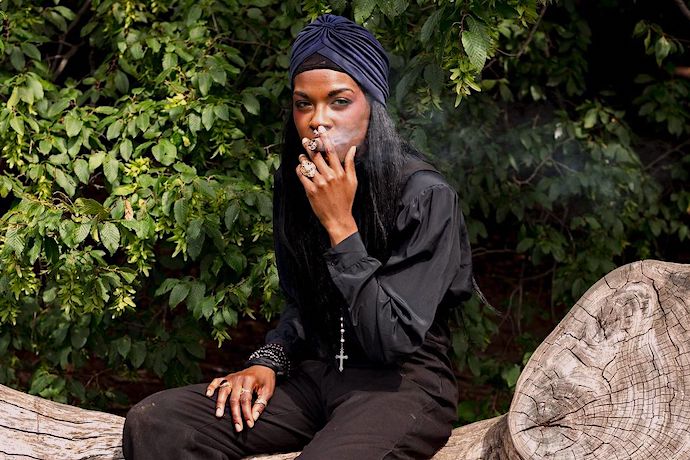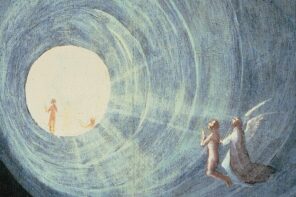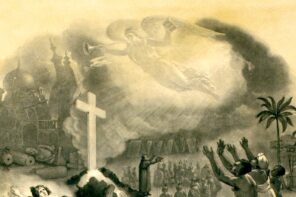Last Tuesday, author and witch J. Allen Cross tweeted out some advice for white people who want more BIPOC speaking and teaching at their “magical witchy” conferences. One of his pieces of advice was, “Stop branding all witchy/magical events as specifically ‘pagan’. A great deal of our folk magic is christian based and the pagan branding makes us and our magic feel unwelcome.”
3) Stop branding all witchy/magical events as specifically “pagan”. A great deal of our folk magic is christian based and the pagan branding makes us and our magic feel unwelcome.
— J. Allen Cross (@WitchOregon) November 9, 2021
What is Cross getting at here? RD wasn’t able to reach him for comment, but witchcraft practices in the West over the past millennium give us an idea. As much as Christian elites have tried to forbid magical practices and label them un-Christian over the centuries, millions of magical practitioners, many of them people of color, have identified themselves and their magical practice as Christian.
It’s become popular for news outlets to profile the apparent rise in modern witchcraft, yet the magic has been with us all along; the tendency for witches to identify as pagan is what’s actually new—this side of the medieval period, at least.
Many Christians will tell you witchcraft is forbidden in scripture. They might point to the magical book-burning Paul orchestrates in Acts chapter 19, or quote the King James Version of the famous passage from Exodus 22, “Thou shalt not suffer a witch to live.” Christian ministers and leaders in Europe and the United States have often condemned magic in the centuries since, with many of the more recent versions involving pop culture, like the banning of Harry Potter books for supposedly containing actual spells.
Contrary to the opinion of these leaders, many Christians over the centuries have practiced magic and considered their magic Christian. In the academic field of religious studies, scholars ideally don’t privilege the testimony of what Christian leaders claim is proper Christianity over the testimony of less-elite Christians. It’s not up to Christian elites to decide whether magic (or anything else for that matter) is or is not “Christian.” In Haiti there’s a saying that the population is 70% Catholic, 30% Protestant and 100% Vodou.* In other words, we needn’t see Christianity as incompatible with any number of practices or beliefs associated with other religions or cultures.
Examples of Christian popular magic are plentiful. The local practitioners of magic of early modern England known as “cunning-folk” identified as Christian, as did those who used their magical services. Historian of European magic Owen Davies provides an example of a popular Christian magical charm from the era meant to protect buildings from harm. The cunning-person would write, in Latin, Omnis spiritus laudet Dominum: Mosen habent et Prophetas: Exurgat Deus et dissipentur inimici ejus, or: “Let every spirit praise the Lord: they have Moses and the Prophets: Let God arise and his enemies be scattered.”
The second line comes from Luke 16:29 in the Christian Bible, and the last line comes from Psalm 68. Historian Yvonne Chireau, who examines Hoodoo, or Black American folk magic, describes Christian folk magic in a later American context. Many practitioners of Hoodoo saw the Bible as a powerful source of spells and charms, and the words of scripture themselves were thought to magically ward off evil when worn as a medallion. As Chireau notes, Black American author and ethnographer Zora Neale Hurston observed that Hoodoo practitioners viewed Moses as a powerful African miracle worker and the greatest conjurer.
Recent profiles of witchcraft have often focused on young witches who self-identify as pagan and who self-consciously distance themselves from Christianity. But while magic in antiquity existed in a diverse religious milieu that included pagan, Christian, and Jewish influences, magic has existed in a primarily Christian context for the past thousand years in the West—until recently, of course. Given the different role Christianity plays in BIPOC vs. white American cultures we shouldn’t view it as incidental that Cross, who describes himself as being “of Mexican, Native American, and European descent,” is among the voices urging his community to decouple witchcraft from an exclusively pagan identity. But we also shouldn’t be surprised if there’s pushback from those whose identity is predicated on this equivalency.
*There are many variations on the saying, with the most popular being that “Haiti is 90% Catholic and 100% Vodou.” Regardless of the version, the essence remains the same.





